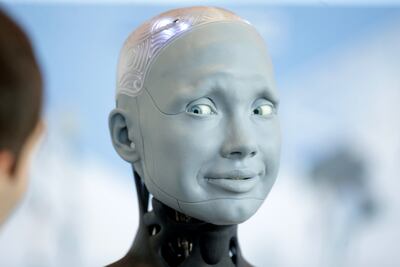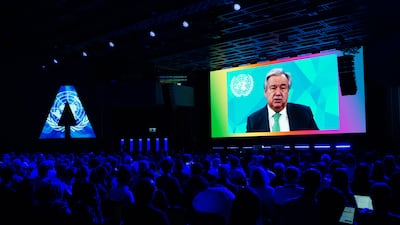UN Secretary General Antonio Guterres has announced his intention to establish a high-level advisory group on artificial intelligence (AI).
Addressing the opening day of the AI For Good summit in Geneva on Thursday, he emphasised the need to balance the potential and possible pitfalls of AI.
While rapid technological development has caused concern over issues such as autonomous lethal weapons and the proliferation of misinformation, Mr Guterres also highlighted AI's potential to contribute to global challenges.
"I look to the AI For Good summit to continue to explore practical applications of AI that can advance the sustainable development of goals," he said.
"These applications will complement the work of the high-level advisory body on AI that I am planning to establish, as well as the global digital compact and preparations for the summit of the future next year."
The Secretary General was speaking remotely to the summit, which is convened by the International Telecommunication Union (ITU).
“AI also has the potential for enormous good," he said. "Its powerful tools could drive forward a 2030 agenda and the sustainable development goals by making a massive leap in health care and eradicating diseases that affect millions, by transforming education and in empowering people everywhere to build a better future."
With 3,000 experts from tech giants, universities and international organisations expected to attend, the meeting is expected to lay the groundwork for handling AI responsibly.
Notable participants include Amazon's chief technology officer Werner Vogels, Google DeepMind chief of operations Lila Ibrahim and various AI-based humanoids.

Doreen Bogdan-Martin, head of the ITU, stressed the importance of action. “Doing nothing is not an option," she said. "Humanity is dependent upon it. So we have to engage and try to ensure a responsible future with AI”.
Participants will also explore the potential to advance the UN’s sustainable development goals. However, they remain aware that AI could also exacerbate social inequalities or introduce biases.
Mr Guterres is optimistic the summit can help ensure “AI charts the course that benefits humanity”.
Regulatory actions are already under way in response to the development of AI.
EU politicians recently pushed for one of the world’s first laws regulating systems such as OpenAI’s ChatGPT chatbot, which have triggered a proliferation of generative AI content, raising legal and ethical questions.
Balancing these concerns with the potential of AI to tackle global challenges remains the key objective of the summit.
Mr Guterres said: “Together, let's spare no effort to harness the power of AI for good.”


